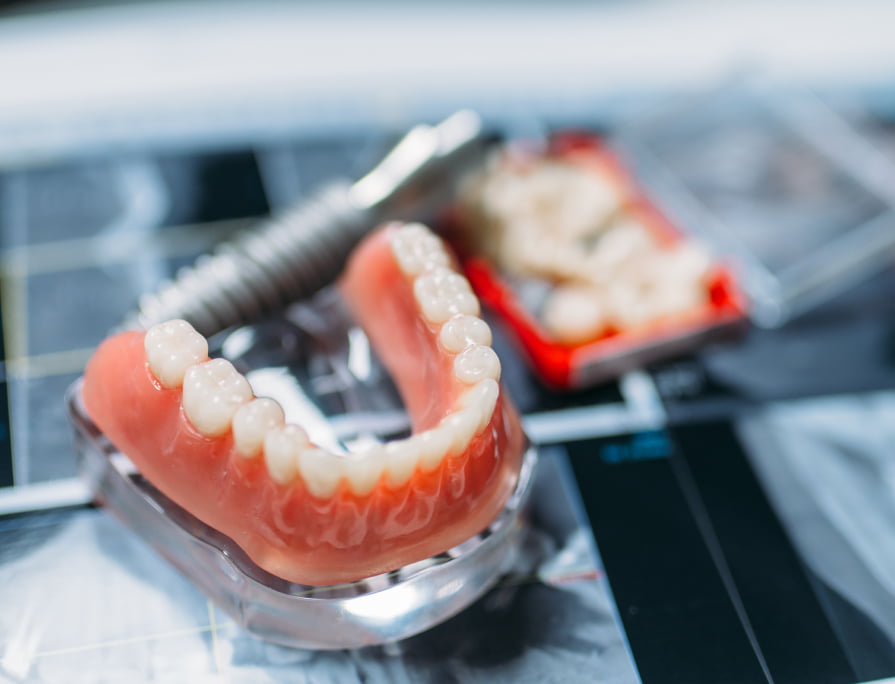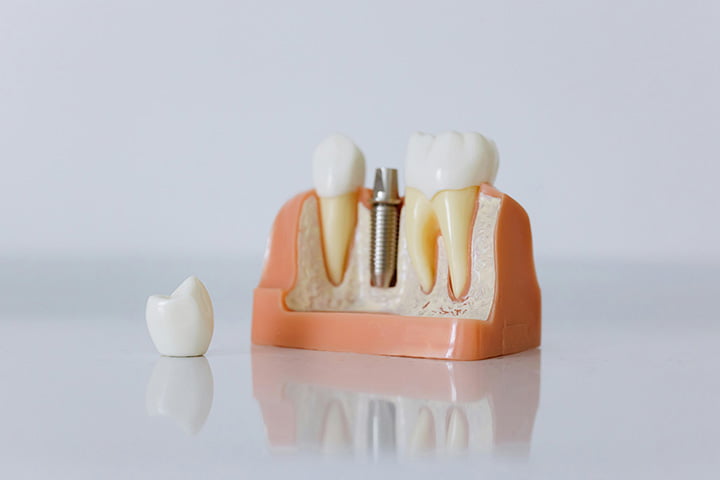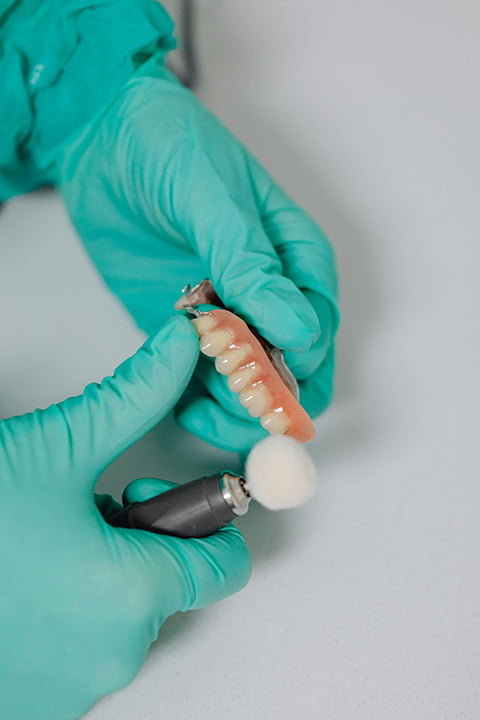
New Smile.
New Life!
New Smile.
New Smile.

When it comes to replacing missing teeth, two popular options are dental implants and dentures. Both serve the critical purpose of restoring functionality and aesthetics to your smile. However, in the long term, implants are usually the better option. In this comprehensive guide, we’ll look into the intricacies of dental implants and dentures, helping you navigate through the decision-making process to determine which option best suits your needs.
Dental implants are sophisticated tooth replacements that mimic the natural structure of your teeth. They consist of three main components: a titanium implant fixture that integrates with the jawbone, an abutment that connects the implant to the prosthetic tooth or crown, and the prosthetic bone graft or tooth itself. This innovative solution provides a permanent and stable foundation for replacement teeth.
Dentures, on the other hand, are removable prosthetic devices designed to replace missing teeth and surrounding tissues. They come in two primary types: partial dentures, which replace a few missing teeth, and full dentures, which replace an entire arch of teeth. Dentures are typically made from acrylic or a combination of acrylic and metal, offering a more affordable and non-invasive alternative to dental implants.
Regardless of the method chosen, tooth replacement is crucial for maintaining oral health and overall well-being. Missing teeth can lead to a variety of issues, including difficulty chewing, speech impediments, and changes in facial structure. By restoring missing teeth, dental implants and dentures help preserve proper bite alignment, prevent bone loss, and enhance confidence in one’s smile.
In addition to dental implants and dentures, there are various other dental restoration options available, each with its own set of benefits and considerations. These may include dental bridges, which involve anchoring prosthetic teeth to adjacent natural teeth, and implant-supported dentures, which combine the stability of implants with the affordability of dentures. During your consultation with a dental professional, you’ll explore these options in detail to determine the most suitable treatment plan for your unique needs and preferences.

Dental implants are state-of-the-art tooth replacements that offer a permanent solution for missing teeth. They consist of three primary components:
Implant Fixture: This is a small, screw-like titanium post that is surgically placed into the jawbone. It serves as the artificial tooth root and provides a stable foundation for the replacement tooth.
Abutment: The abutment is a connector piece that attaches to nearby teeth and the implant fixture. It protrudes above the gum line and serves as the anchor for the prosthetic tooth or crown.
Prosthetic Tooth or Crown: The prosthetic tooth, typically made of porcelain or ceramic, is custom-designed to match the shape, size, and color of your natural teeth. It is securely attached to the abutment and provides a functional biting surface.

The process of getting dental implants typically involves several steps:
Your dentist will conduct a thorough examination of your oral health, including X-rays and impressions, to assess your eligibility for dental implants.
During a minor surgical procedure, the implant fixture is placed into the jawbone. Over time, the bone fuses with the implant through a process called osseointegration, providing a solid foundation for the prosthetic tooth.
Following dental implant surgery and placement, a healing period of several months is necessary to allow the implant to integrate with the jawbone. During this time, temporary restorations may be worn to maintain aesthetics and function.
Once osseointegration is complete, the abutment is attached to the implant fixture. This step prepares the implant site for the placement of the permanent prosthetic tooth.
Finally, the custom-designed prosthetic tooth or crown is securely attached to the implant abutment, completing the dental implant restoration.

Dental implants offer numerous advantages over traditional tooth replacement options, including:
Implants closely resemble natural teeth in both appearance and function, providing a seamless and aesthetically pleasing solution for missing teeth.
With proper care, dental implants can last a lifetime, making them a durable and cost-effective investment in your oral health.
Unlike dentures and dental bridges, which can lead tooth decay and to bone loss over time, dental implants stimulate the jawbone, helping to maintain its strength and integrity.
Before undergoing dental implant surgery or treatment, it’s essential to consider the following factors:
Dental implants can be more expensive upfront compared to other tooth replacement options. However, they offer long-term benefits that may outweigh the initial investment.
Not everyone is a suitable candidate for dental implants. Factors such as overall health, gum health, and bone density play a crucial role in determining eligibility.
While dental implants have a high success rate, there are risks associated with any surgical dental implant procedure, including infection, nerve damage, and implant failure. It’s essential to discuss these potential complications with your dentist before proceeding with treatment.

Dentures come in two primary types, each catering to different tooth replacement needs:
Partial dentures are used when only a few teeth are missing. They consist of replacement artificial teeth attached to a gum-colored base, which is supported by metal framework or clasps that attach to natural teeth.
Full dentures are utilized when all teeth in an arch are missing. They comprise a complete set of replacement teeth attached to a gum-colored acrylic base. Full dentures may be further categorized as conventional (placed after the gums have healed from the missing tooth or extraction) or immediate (placed immediately after tooth extraction).
Dentures function by resting directly on the gums and remaining in place through suction or adhesive. Partial dentures are anchored to remaining natural teeth, while full dentures rely on the natural contours of the gums for stability. Despite being a non-invasive option, dentures effectively restore the appearance of a full smile and facilitate basic functions such as chewing and speaking.
Dentures offer several advantages as a tooth replacement option:
Unlike dental implants, which require surgical placement, dentures offer a non-invasive alternative for replacing missing teeth.
Dentures are typically more affordable upfront compared to dental implants, making them a budget-friendly option for individuals seeking tooth replacement.
Dentures are reversible, meaning they can be removed and replaced as needed. This flexibility allows for easy adjustments and repairs over time.
Despite their benefits, dentures also come with some drawbacks to consider:
Dentures may become loose or shift out of place while eating or speaking, causing discomfort and affecting speech clarity.
Over time, wearing dentures can lead to bone loss in the jaw due to a lack of stimulation, resulting in changes to facial appearance and potential difficulties with denture fit.
Proper care and maintenance are essential for ensuring the longevity and functionality of dentures. This includes daily cleaning, regular dental check-ups, and periodic adjustments to accommodate changes in the oral cavity.
Understanding the types, functionality, benefits, and drawbacks of dentures is crucial for making an informed decision about tooth replacement options. A consultation with a dental professional can provide personalized guidance based on your specific oral health needs and preferences.
When considering tooth replacement options, it’s essential to weigh the pros and cons of dental implants and dentures to determine which solution aligns best with your needs and lifestyle.
Dental Implants: Offer a natural-looking and permanent solution that closely resembles natural teeth. They provide excellent stability and functionality, allowing for comfortable chewing and speaking.
Dentures: Provide an artificial but aesthetically pleasing smile. They may not offer the same level of stability and functionality as dental implants, leading to potential discomfort and difficulty with certain activities.
Dental implants have the potential to last a lifetime with proper care and maintenance. Implants offer superior durability compared to dentures, as they are securely anchored to the jawbone.
Dentures typically require periodic adjustments and replacements due to wear and tear. Have a shorter lifespan compared to dental implants and may need to be replaced every 5 to 10 years.
Dental implants stimulate the jawbone, helping to prevent bone loss and preserve facial structure. They do not compromise the health of adjacent teeth, as they do not rely on neighboring teeth for support.
Dentures may contribute to bone resorption over time, leading to changes in facial appearance and potential difficulties with denture fit. They can cause irritation or damage to gum tissue or the gums if not properly fitted or maintained.

Dental Implants: The initial cost may be higher than dentures due to surgical placement and materials. Implants are a long-term investment that may be more cost-effective over time, considering their longevity and durability.
Dentures: are generally more affordable upfront compared to dental implants. Additional costs may arise from periodic adjustments, repairs, and replacements.
Dental Implants: There are minimal diet restrictions, as implants provide strong and stable chewing functions similar to those of natural teeth. Implants come with an easy maintenance routine, requiring regular brushing and flossing like natural teeth.
Dentures may require dietary modifications to avoid hard or sticky foods that could dislodge or damage the dentures. They require daily cleaning and proper storage to prevent bacterial growth and maintain oral hygiene.
Dental implants are typically associated with higher patient satisfaction due to their natural appearance and functionality. They contribute to improved self-confidence and quality of life, allowing individuals to enjoy social interactions without fear of denture slippage or discomfort.
With dentures, patient satisfaction may vary depending on individual preferences and adaptations to wearing them. They must be properly fitted and maintained. Dentures can still significantly improve speech, chewing ability, and overall comfort for many individuals.
Understanding the differences in appearance, functionality, longevity, cost, and impact on lifestyle between dental implants and dentures is essential for making an informed decision about tooth replacement options. A consultation with a dental professional can provide personalized guidance based on your specific oral health needs and preferences.
When it comes to choosing between dental implants and dentures, several factors should be considered to ensure the best possible outcome for your oral health and overall well-being.
Schedule a consultation with a qualified dentist to discuss your tooth replacement options. A professional assessment will help determine your eligibility for dental implants and provide personalized recommendations based on your oral health status and treatment goals.
Evaluate the financial aspects of dental implant treatment versus dentures, including initial costs, long-term maintenance, and potential insurance coverage. Discuss payment options and financing plans with your dental provider to ensure the affordability and accessibility of treatment.
Recognize that no tooth replacement option is without compromises and trade-offs. Be prepared to weigh the benefits and drawbacks of each option and make informed decisions that align with your individual needs and circumstances.
Choosing between dental implants and dentures requires careful consideration of various factors, including consultation with dental professionals, personal preferences, financial considerations, and potential compromises.
Dental implants are permanent replacements for missing teeth that are surgically implanted into the jawbone, providing stability and functionality similar to natural teeth. Dentures, on the other hand, are removable prosthetic devices that rest on the gums and are typically used to replace multiple missing teeth. While dental implants offer superior longevity and durability, removable dentures are often more affordable and provide a non-invasive solution for tooth replacement.
Eligibility for dental implants depends on various factors, including overall oral health, gum health, bone density, and medical history. A consultation with a qualified dentist or prosthodontist is necessary to assess your suitability for dental implant treatment. They will conduct a thorough examination and discuss your treatment options based on your individual needs and circumstances.
With proper care and maintenance, dental implants have the potential to last a lifetime, as they are securely anchored to the jawbone. Dentures, on the other hand, typically need to be replaced every 5 to 10 years due to wear and tear. Regular dental check-ups and proper oral hygiene practices are essential for maximizing the longevity and functionality of both dental implants and dentures.
Dental implants offer strong and stable chewing function similar to natural teeth, allowing for minimal dietary restrictions. However, denture wearers may need to avoid hard or sticky foods that could dislodge or damage the dentures. It’s essential to follow any dietary recommendations provided by your dental provider to ensure the longevity and functionality of your tooth replacement solution.
The cost of dental implants and dentures varies depending on various factors, including the number of teeth being replaced, the materials used, and the complexity of the treatment. In general, dental implants tend to have a higher initial cost compared to dentures due to surgical placement and materials. However, dental implants may offer long-term benefits that may outweigh the initial investment. It’s essential to discuss payment options and financing plans with your dental provider to ensure the affordability and accessibility of treatment.
Texas Sedation Dental & Implant Center can perform minor, or major procedures for patients in need. Our goal is to provide exceptional oral health, overall, for all. It’s recommended to schedule an appointment with your Dentist if you are experiencing any of concern. To learn more about bone grafting, or dental implants, contact us today at our Longview (903)704-0154. or Tyler Office (903)597-2201.